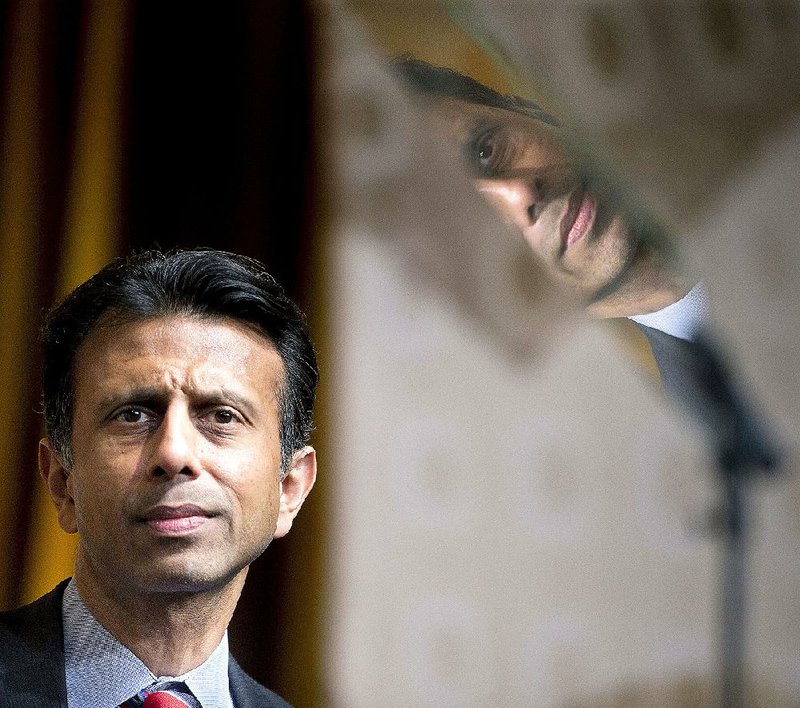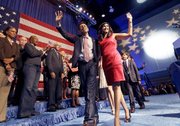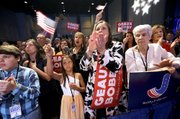KENNER, La. -- Republican Gov. Bobby Jindal of Louisiana announced Wednesday that he is entering the 2016 presidential race, and set out to distinguish himself in a field packed with better-known rivals.
"We have a bunch of great talkers running for president," Jindal said at his opening rally. "It's time for a doer. I'm not running for president to be somebody. I'm running for president to do something."
An Oxford-educated son of Indian immigrants, Jindal can point to a political career filled with many achievements in a short time: a position as state health secretary when he was 24, election to Congress at 32 and election as Louisiana's first nonwhite governor since Reconstruction four years later.
But the GOP lineup does not lack seasoned politicians, some of whom are better-known nationally than Jindal.
The governor announced his campaign online earlier Wednesday. Video clips on his website showed Jindal and his wife, Supriya, talking to their three children about the campaign to come.
Aides discussed Jindal's plans to focus on social conservatives, as he has done for months in extensive travels, and highlight his reputation as a leader steeped in policy.
Jindal, 44, intends to present himself as "the youngest candidate with the longest resume," citing an extensive background in public policy and government, strategist Curt Anderson said.
Jindal waited until the state legislative session had ended and lawmakers had found a way to close a $1.6 billion budget gap before he scheduled his presidential announcement. But he has been building his campaign for months with trips to key presidential voting states, particularly Iowa, where he has focused on Christian conservatives.
Raised a Hindu but a convert to Catholicism as a teenager, Jindal has talked of his religious faith in small churches across Louisiana. As he readied his presidential campaign, the governor put out an executive order to grant special "religious freedom" protections to people in Louisiana who oppose same-sex marriage.
He is competing with several Republicans, including Sen. Ted Cruz of Texas and former Arkansas Gov. Mike Huckabee, who also are trying to appeal to the same pool of evangelical voters.
While Jindal will continue to focus on "religious liberty," Anderson said, he aims to prove a candidate can be "both smart and Christian."
In recent weeks, Jindal also has worked to showcase more of his policy ideas, rather than just focusing on cultural issues. He has drawn distinctions between him and other GOP contenders by noting he has published "detailed plans" on health care, defense, education and energy policy.
He has suggested that governors are better equipped than legislators to become president because they have run state governments, balanced budgets and implemented policy. But that's an argument other White House hopefuls can make as well, including former Florida Gov. Jeb Bush as well as Govs. Scott Walker of Wisconsin, Chris Christie of New Jersey and John Kasich of Ohio, who are considering presidential runs of their own.
Campaign manager Timmy Teepell, a former chief of staff who ran Jindal's two races for governor, said Jindal will focus on the states that vote early in the presidential race, not a "national campaign." Jindal has trips planned to New Hampshire and Iowa later this week.
Anderson estimated that a candidate needs support from 26,000 voters to win Iowa: "This race hasn't started. We haven't caught fire yet because we haven't even tried."
But the Louisiana governor has visited Iowa frequently and hasn't gained significant traction in polls there so far.
Jindal also doesn't get glowing reviews of his governance at home.
At age 24 in 1996, Jindal was appointed secretary of the state Department of Health and Hospitals, the biggest department in state government, and he quickly went to work cutting jobs and slashing its budget.
At age 33 in 2004, he was elected to Congress from the New Orleans suburbs after losing one year earlier in his first bid for governor. At age 36 in 2007, he ran for governor again and won, becoming the nation's youngest governor.
Jindal was initially popular as governor. He tackled an ethics-policy overhaul in a state known for corruption, won kudos for handling the BP oil spill and delivered on a promise to shrink government. He privatized charity hospitals, cut 30,000 jobs, and reduced the budget by $10 billion. He won his 2011 re-election with about 66 percent of the vote.
He also presided over a series of budget crises, caused by the loss of federal help for Hurricane Katrina recovery, the recession, statutory protections for spending, the cumulative effect of one-time budget fixes, and Jindal's hard line against raising taxes.
By early this year, with the state facing a $1.6 billion budget hole, even Republican legislators were accusing him of spending too much time in Iowa testing the presidential waters and of using gimmicks to protect his tax-averse reputation.
The shortfall caused the state's public colleges and universities, which already sustained deep cuts, to consider mass layoffs and shutting departments. Earlier this month, lawmakers reached an agreement to close the shortfall that, because of a complex arrangement of tax credits, allows Jindal to technically claim that the state had passed a balanced budget without raising new tax revenue.
Jindal and his aides defended his record and his tax-credit plan, saying the budget that passed protected higher education and health care, and attributing the criticisms about him within the state to his penchant for slashing bloated bureaucracies.
"Nobody has a record like he does of actually shrinking the size of the government," Anderson said. "The budget is 26 percent smaller than when he first took office."
Others were less flattering.
"He's a lame-duck governor, and the state's broke," said Bernie Pinsonat, a Louisiana pollster who works for both Democrats and Republicans. "He's worn out his welcome with the voters."
If his low support in the state is reflected in national polls early on, that could hurt Jindal's chances of competing with better-known rivals. Fox News and CNN are limiting the first two major Republican debates to candidates who rank in the top 10 in national polls, meaning he could be excluded from nationally televised face-offs with his rivals.
Jindal is the 13th Republican to enter the race, and several others have said they may seek the nomination as well.
Kasich and Walker
One Republican who has hinted at a presidential run, Kasich of Ohio, spoke about immigration policy Wednesday during his first trip to Iowa, saying it's not practical or humane to deport the millions of people who are in the U.S. illegally.
"I'm not for putting them on a school bus, driving them to the border, opening the door and just telling them to get out," Kasich said.
He favors fines for those here illegally but said Republicans need to show more compassion toward immigrants and minority groups, as well as more sensitivity on the environment.
Plain-spoken, but with deadpan wit, Kasich drew applause and timely laughs from an audience of about 200 during a question-and-answer session in Des Moines.
Kasich also said he is open to sending U.S. fighting forces into direct combat in Iraq against the Islamic State group, which has overtaken cities that U.S. troops fought to seize from insurgents after the 2003 U.S.-led Iraq invasion.
"We should have a coalition and, if we have to, put boots on the ground and start destroying these people," Kasich later told a group of about 50 Republican professionals in Des Moines. "I think we have to be careful about where we go. But when we go, we have to mean business."
Among other GOP presidential prospects, Sen. Lindsey Graham of South Carolina, former Texas Gov. Rick Perry and former Sen. Rick Santorum of Pennsylvania also have called for sending combat troops to Iraq.
Kasich said he'll decide soon whether to enter the 2016 race.
Another potential Republican contender, Walker of Wisconsin, waded into the debate over health care Wednesday, saying that if the U.S. Supreme Court strikes down health care subsidies available under federal law, it's up to President Barack Obama and Congress to fix it -- not the states.
Walker wrote an opinion piece and answered questions about the matter after a bill signing ceremony in Milwaukee. The Supreme Court is expected to rule this month on whether subsidies under the Patient Protection and Affordable Care Act can continue to go to Wisconsin and 33 other states that use the federal healthcare.gov website and don't run their own insurance exchanges.
Walker, who has called for a repeal of the health care law, was asked what his contingency plan was if the subsidies are struck down.
"President Obama created the problem, the previous Congress created the problem, they should fix it. As usual, they're going to want to kick the problem to the states, and we're not going to take it," Walker said.
Walker also defended the timing of his public event Wednesday, saying the signing of two bills that loosen Wisconsin's gun laws had been scheduled before nine people were shot and killed last week in a South Carolina church.
With his signature, the governor eliminated the state's 48-hour waiting period for handgun purchases and allowed off-duty, retired and out-of-state police officers to carry firearms on school grounds. Both measures passed earlier this month in the GOP-majority state Legislature with bipartisan support.
The timing of the bill signing comes at a time of a renewed debate over gun control and race relations after the fatal shootings at a black church in Charleston on June 17; a white man faces multiple murder charges.
Walker said the bill-signing event was scheduled June 11. After next Tuesday, the measures would have become law without his signature.
"If we had pulled back on this, I think it would have given people the erroneous opinion that what we signed into law today had anything to do with what happened in Charleston," Walker said at the ceremony.
Information for this article was contributed by Melinda Deslatte, Thomas Bauemont, Scott Bauer and Dana Ferguson of The Associated Press; by Manny Fernandez of The New York Times; and by Margaret Newkirk of Bloomberg News.
A Section on 06/25/2015



